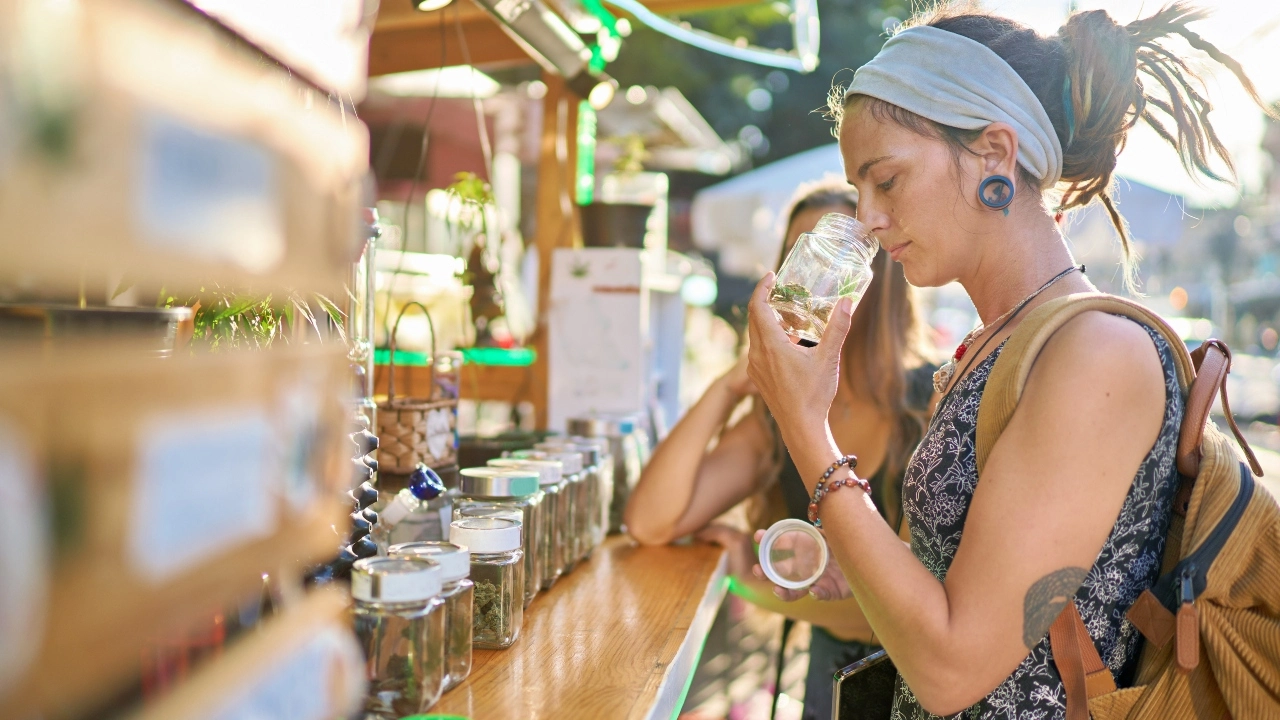As the cannabis industry evolves and competition heats up, some retailers are re-imagining the consumer shopping experience. And their efforts are translating into increased sales.
Chicago-based marijuana multistate operator Verano Holdings Corp. recently unveiled what it’s calling a “bodega-style” cannabis store in Phoenix.
Verano’s Zen Leaf Phoenix-Cave Creek location gives visitors the opportunity to browse and choose the cannabis items they want – just like they would at any other retailer – rather than stand at a counter and talk to a budtender in order to peruse product.
Customers can pick up a package and read the label to see the product information, including the THC and CBD content and terpene profile.
That’s something they’re less likely to do when they’re standing in front of an employee at the counter, company officials believe.
Bodega-style marijuana sales better for customer
“I think it makes it less intimidating because they’re not walking up to the counter and having a conversation,” said Robert Cohen, Verano’s executive vice president of retail.
“They’re walking through the store and talking to a cannabis adviser,” he added. “They’re having an honest one-on-one conversation in an open and non-intimidating way.”
Customers have told Zen Leaf employees that they are discovering products they wouldn’t otherwise find. And those who place orders online are adding items to their baskets once they see the full range of products available in person.
“When you allow people to wander or forage in a store, they will encounter things they ordinarily wouldn’t,” Cohen said.
“You can walk up to a cooler and buy a soda from us, which people are doing. Before, you weren’t thinking about getting a soda when you walk up to a cannabis store counter.”
The deli-style debate
In states where it’s permitted, some cannabis companies offer the elusive “deli-style” retail experience, where consumers can see and smell flower before choosing to buy.
Arizona, Missouri, Colorado and Oregon allow this to some extent, with “sniff jars” offering customer the opportunity to smell the aroma.
In some stores, the flower is pulled from a larger jar, and then weighed and packaged for the customer rather than sold in the prepackaged bags or jars state rules mandate in California and New York.
“When we think about shopping for flower, we think about it as a similar way to shopping for produce,” said Boston Dickerson, CEO of Show-Me Organics, parent company of Blue Sage Cannabis Deli, which has five locations in Missouri.
“If you’re going to pay a high price, you should know what you’re going to get.”
Verano also uses sniff jars in markets that allow them.
“The beauty of a sniff jar is it gives the customer the experience they’re going to have when they open that bag up,” Cohen said.
But using sniff jars presents challenges. And while some customers fondly remember the days of deli-style shopping before adult-use legalization, that may be a bygone era as the industry matures.
Questions of hygiene and safety
Product stability and shelf life deteriorate because jars opened repeatedly expose flower to air, said Darwin Millard, technical director for St. Louis-based compliance service Cannabis Safety & Quality.
And the hygiene issues that come from a parade of people sticking their noses close to cannabis flower are even more worrisome.
Many states prohibited deli-style shopping during COVID, much like Starbucks removed condiments such as cinnamon from the coffee bars in its cafes.
“Many hands and noses are on that jar – that jar becomes a potential source for contamination and a disease vector for bacteria and viruses,” Millard said.
An active volunteer with ASTM International, where he has taken the lead for the development of many standards for the cannabis industry, Millard advocates for good manufacturing practices in deli-style operations.
Minimum food safety standards like gloves, hairnets and facemasks for employees handling exposed products should be employed.
“We can’t control the consumer, but there are things behind the counter we can control,” Millard said.
Millard also raises concerns about marijuana retailers opening customer jars for inspection because they could end up purchasing already-opened products.
He proposes innovative solutions like faux versions of concentrates for visual evaluation and scratch-and-sniff postcards for flower aromas to provide an accurate sensory experience without compromising safety.
Subscribe to the MJBiz Factbook
Exclusive industry data and analysis to help you make informed business decisions and avoid costly missteps. All the facts, none of the hype.
What you will get:
- Monthly and quarterly updates, with new data & insights
- Financial forecasts + capital investment trends
- State-by-state guide to regulations, taxes & market opportunities
- Annual survey of cannabis businesses
- Consumer insights
- And more!
A Missouri success story
New regulations in Missouri, one of the country’s strongest markets, have made offering a deli-style experience more complex, Dickerson said.
However, his commitment to the model remains strong.
Customers report driving past multiple other cannabis shops to visit the Blue Sage Cannabis Deli because they want to be able to see and smell what they’re buying.
Blue Sage employees wear gloves and pick up buds with tongs. They waft the scent so the customers can smell it, and they never sell products from sniff jars to the customer, said Dickerson, who estimates 65% of his flower sales are deli-style.
“Everybody looks at this like consumer packaged goods, but in reality commercial agriculture yields different results from different batches,” Dickerson said.
“It’s important for a consumer to know what their product looks like and smells like before they leave a store.”
Margaret Jackson can be reached at margaret.jackson@mjbizdaily.com.
Medical Disclaimer:
The information provided in these blog posts is intended for general informational and educational purposes only. It is not a substitute for professional medical advice, diagnosis, or treatment. Always seek the advice of your physician or other qualified healthcare provider with any questions you may have regarding a medical condition. The use of any information provided in these blog posts is solely at your own risk. The authors and the website do not recommend or endorse any specific products, treatments, or procedures mentioned. Reliance on any information in these blog posts is solely at your own discretion.






